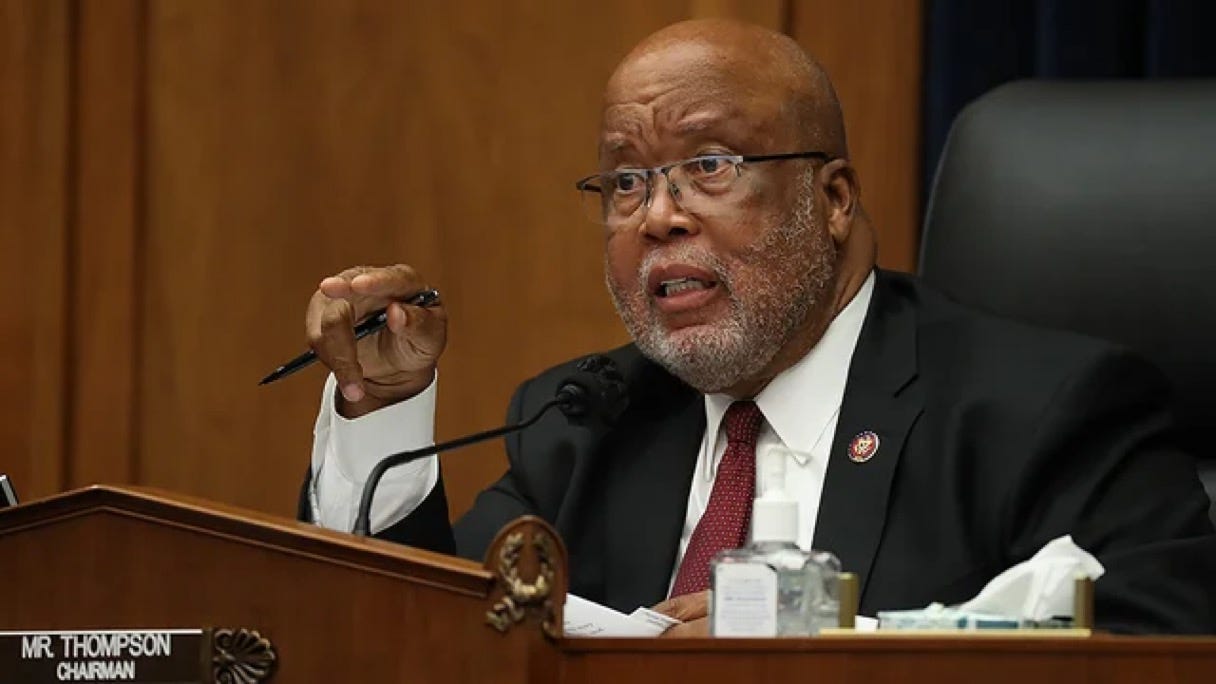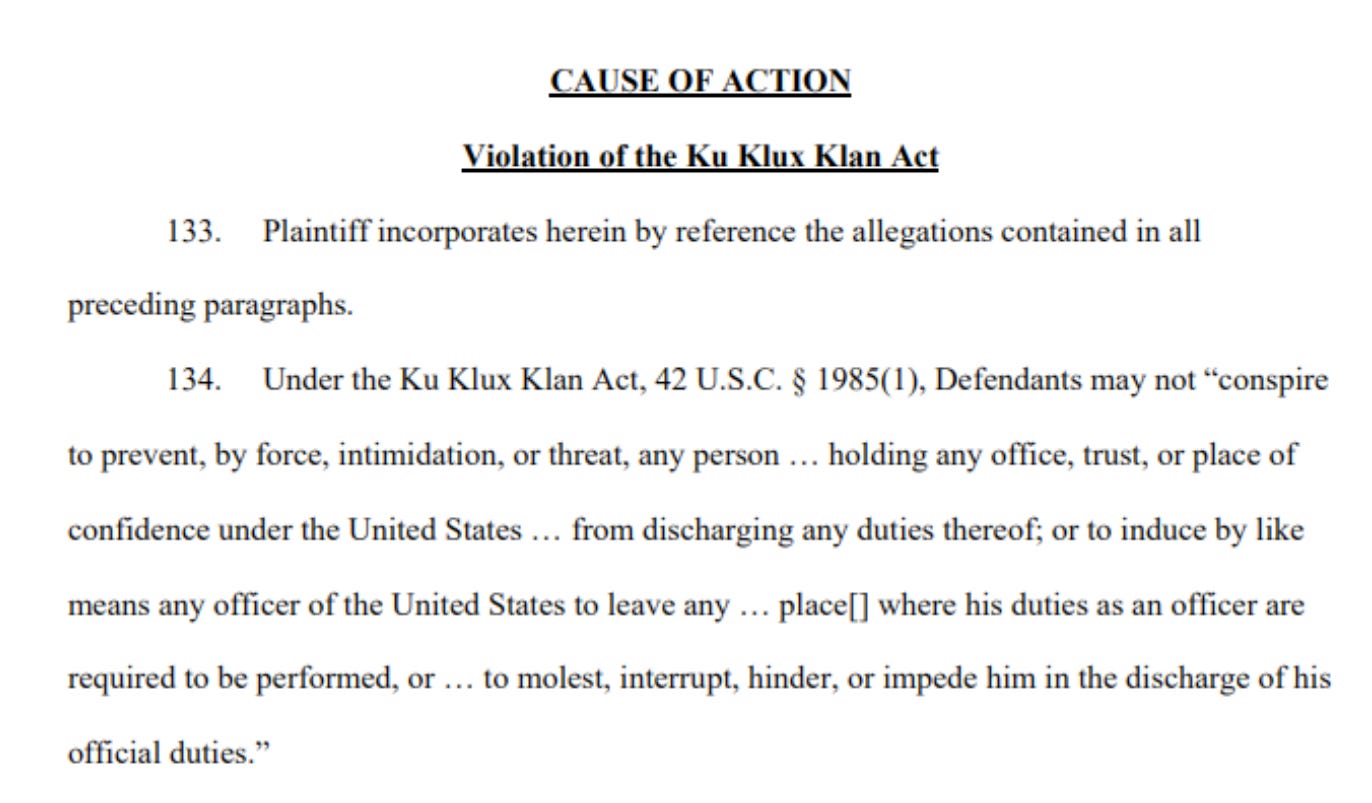
Rep. Bennie Thompson Wants To Put Trump Out of Business With His Lawsuit. Could He Do It?
The NAACP thinks so, because it’s done this before.
Rep. Bennie Thompson (D-MI) recently filed a civil lawsuit against Donald Trump and Rudy Giuliani. In it, Thompson alleges that the individual defendants and the far-right groups Proud Boys and Oath Keepers conspired to incite the attack on Congress on January 6th while lawmakers were gathered to reaffirm President Biden's Electoral College victory. Thompson hopes that the damages from the suit will put Trump “out of business.”
In the lawsuit, Mr. Thompson said he was forced to wear a gas mask and hide on the floor of the House gallery for hours while hearing “threats of physical violence against any member who attempted to proceed to approve the Electoral College ballot count.” Mr. Thompson also heard a gunshot, which he did not learn until later had killed one of the rioters in the Capitol lobby. “I feared for my life,” Thompson told reporters.
Could such a civil lawsuit do real damage? The NAACP thinks so. It has joined forces with the powerhouse law firm of Cohen Milstein to back Thompson in his suit. NAACP president Derrick Johnson said the decision to sue for money damages was rooted in a long history of tools that have worked to fight back against white supremacy.
The complaint focuses on a little known statute that could become a real thorn in the side of the former president. In fact, the Ku Klux Klan Act of 1871 seems almost tailor-made for exactly this kind of situation. That law forbids two or more people from conspiring to “prevent, by force, intimidation, or threat,” any office-holder from performing their duties. If Thompson can prove that Trump and Giuliani had any kind of an agreement with far-right groups to stop the Electoral Count by Congress, then bingo: a strong claim under this old law.
A bit of history is in order, as we’re talking about a 150 year old statute. After the Civil War, the KKK was terrorizing the South under Reconstruction. The guarantees of equal protection under the 14th Amendment were being ignored as the KKK seemed to act with impunity, using extreme and public violence to keep freed slaves fearful and prevent them from enjoying any liberties or protections under the law. Congress responded by passing a series of anti-KKK laws giving the federal government much greater power to enforce the laws locally, resulting in the arrest and federal prosecution of many KKK members and leaders across the South. (Ironically and soberingly, the electoral college chaos of 1876 resulted in a compromise by which, in order for Hayes to gain southern electoral college support, federal troops withdrew from the Reconstruction South, beginning a new and long era of unrestricted terror against African Americans by the KKK.)
One anti-KKK law was the “Enforcement Act of 1871,” which included a right of private citizens to bring civil suit in federal court to enforce the guarantees of equal protection. One of the big problems in the South was intimidation by the KKK of elected officials, including Congressmembers, who were working to counter and suppress the organization. The private right of enforcement by civil suit was included within the Enforcement Act in the hope it would provide a strong economic deterrent to organized terror.
Honestly, it didn’t work very well. In fact, the private right of enforcement didn’t really begin to have any teeth until over 80 years later, when it began to be used in the 1950s by the NAACP. The law gained further strength when it was used more recently by the Southern Poverty Law Center to bankrupt the KKK in Kentucky in 2008 and by the NAACP to sue the group behind the Charlottesville white nationalist rally in 2017.
The current suit could be a real problem for Trump. He is being sued in his personal capacity, meaning he was acting outside the scope of his official duties. If this sticks, he won’t be able to hide behind claims of executive privilege, especially with respect to criminal communications he may have made with Giuliani or others about the riot. If the suit progresses, Trump will have to respond to discovery requests and even sit for a deposition and give testimony—unless he and others claim the Fifth Amendment, the optics of which would be disastrous for both him and the GOP.
Trump’s best hope of stopping this suit is to move for it to be delayed while “related” criminal cases against the alleged co-conspirators proceed. Notably, however, there are no criminal charges as yet filed against Trump or Giuliani, so for now this tactic isn’t likely to succeed.
The money damages owing from the attack on Congress could be substantial. They cover not only compensatory damages, including the inflection of emotional distress, but also possible punitive damages and attorneys’ fees. And importantly, Trump will not be able to keep his involvement in the insurrection out of the headlines—but it won’t be Nancy Pelosi or Joe Biden putting his conduct back in the spotlight. Added to his other legal woes, including criminal and civil investigations in the state of New York and the defamation lawsuit filed by Jean Carroll around her allegations of sexual assault, Trump could be bogged down and even bankrupted by these allegations if he and his lawyers cannot shake loose of the claims on motions to dismiss.
The political consequences might also be severe. The lawsuit, along with ongoing Justice Department investigations and arrests, could tie Trump even more closely to the right-wing hate groups who planned and executed the attack. This would force GOP officials to either double down on a man who was part of a criminal conspiracy, or walk away from him publicly. And so the GOP Civil War ignited by Trump’s support of the insurrection would continue.
It also appears that many other Congressmembers might join the suit against the defendants, perhaps as a class action, giving greater moral strength to the case. Much as Trump and the GOP would like to “move on” from the attack, it is heartening to see that they are not going to get a pass.












Wow! Cohen Milstein has a pretty large repository of cases for review on their website. Looks like Rep. Thompson and the NAACP chose the right legal representation! https://www.cohenmilstein.com/cases?status=Past%20Success
It IS heartening to see they won't get a pass.